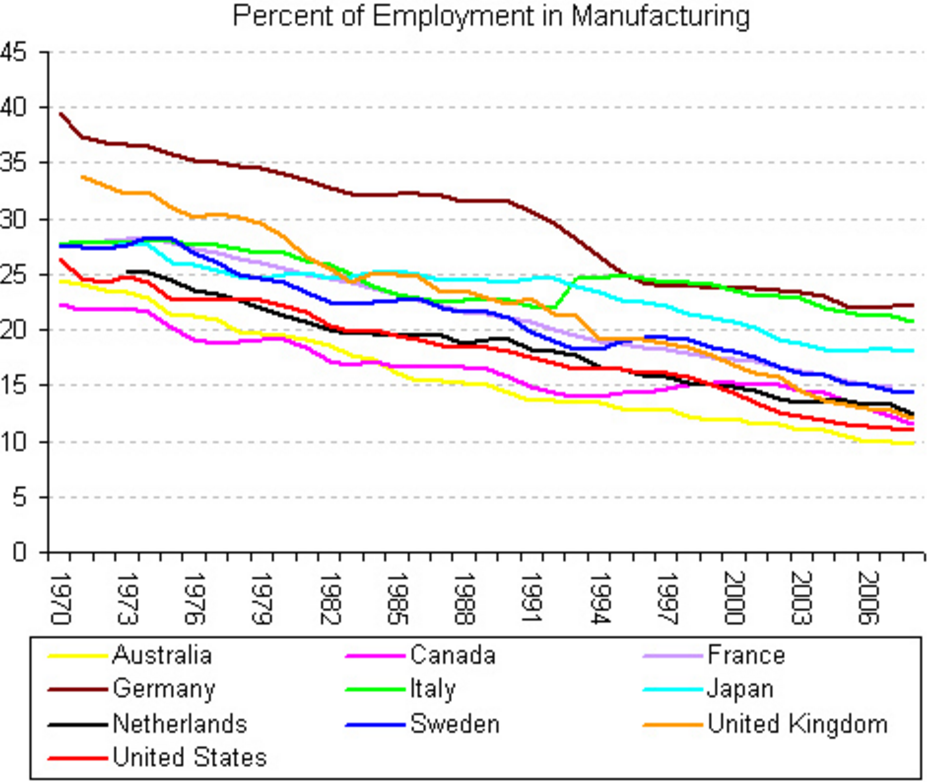
Noah Smith linked to the following recent paper in the AER, by Justin R Pierce and Peter K. Shott. :
Abstract: This paper links the sharp drop in US manufacturing employment after 2000 to a change in US trade policy that eliminated potential tariff increases on Chinese imports. Industries more exposed to the change experience greater employment loss, increased imports from China, and higher entry by US importers and foreign-owned Chinese exporters. At the plant level, shifts toward less labor-intensive production and exposure to the policy via input-output linkages also contribute to the decline in employment. Results are robust to other potential explanations of employment loss, and there is no similar reaction in the European Union, where policy did not change.
It’s very possible that using cross sectional data, job loss in America is more closely linked to China trade than job loss in Europe. But that doesn’t tell us anything about the macroeconomic factors driving the overall loss in jobs. In fact, Europe has lost jobs in manufacturing just as fast as America:
It’s a bit hard to see all the lines, but the decline in the US has been similar to the decline in Europe. Germany has seen the second sharpest decline (after the UK), while Italy has seen the smallest loss of manufacturing jobs. Interestingly, Germany and the UK have two of Europe’s healthiest overall job markets, and Italy has by far the worst employment situation of the countries on this graph. Manufacturing jobs don’t equate to a healthy job market.
It’s true that the data only goes up to 2008, but this graph shows that Europe suffered a massive job loss in the Great Recession, just like the US (down roughly 12% in Europe, roughly 13% in the US).
As I pointed out in my Chinese rust belt post, manufacturing jobs are declining almost everywhere; it’s a global phenomenon that has little or nothing to do with trade deficits. Indeed Europe’s current account surplus is well over $300 billion, larger than any other single country, including China. If even a massive trade surplus doesn’t prevent US-style job losses in manufacturing, then Trump’s plan has essentially zero chance of success.
I’ll say it again, the argument that job loss in manufacturing is due to trade deficits rather than automation is simply innumeracy.
HT: Nathan Taylor

READER COMMENTS
Andrew_FL
Dec 8 2016 at 10:34am
“Indeed Europe’s current account surplus is well over $300 billion, larger than any other single country, including China”
“Other” should be omitted in this sentence, Europe is not a single country.
Scott Sumner
Dec 8 2016 at 10:59am
Andrew, You are right, I fixed it.
Shane L
Dec 8 2016 at 11:22am
For more data, try Eurostat, which has data on every member state as recently as 2013 and, for a small number of countries, as far back as the 1970s. The number of people working in NACE sector C (manufacturing) as a percentage of all workers fell in every EU member state I could see data for between 2000 and 2013:
http://appsso.eurostat.ec.europa.eu/nui/show.do?dataset=nama_nace10_e&lang=en
John Hall
Dec 8 2016 at 11:36am
Great point!
bill
Dec 8 2016 at 11:42am
This is great info. Thanks.
Nathan Taylor
Dec 8 2016 at 4:02pm
Thanks for posting on this! Appreciate it.
Brett
Dec 8 2016 at 4:34pm
It should have been obvious, too, given that Peak Manufacturing Employment in the US was in the mid-1940s IIRC, and that decline has occurred across both the Bretton Woods Era and the trading regimes that followed its collapse.
Scott Sumner
Dec 8 2016 at 4:43pm
Thanks Shane, I tried Eurostat, but I never seem to be able to make it work. I’ll try again.
Thanks everyone.
E. Harding
Dec 9 2016 at 12:23am
“In fact, Europe has lost jobs in manufacturing just as fast as America:”
-Shouldn’t the graph start in 2000, when the US established Permanent Normal Trade Relations with China? China joined the WTO the following year. Trump keeps blaming job losses on China, so 2000 is the obvious year the graph should start.
Scott Sumner
Dec 9 2016 at 9:22am
Harding, The bottom graph starts in 2000. And yes, The US has more job loss since 2000, but not much difference since 2003. The bigger US job loss since 2000 is due to the 2001 recession.
China joined the WTO in December 2001.
Comments are closed.